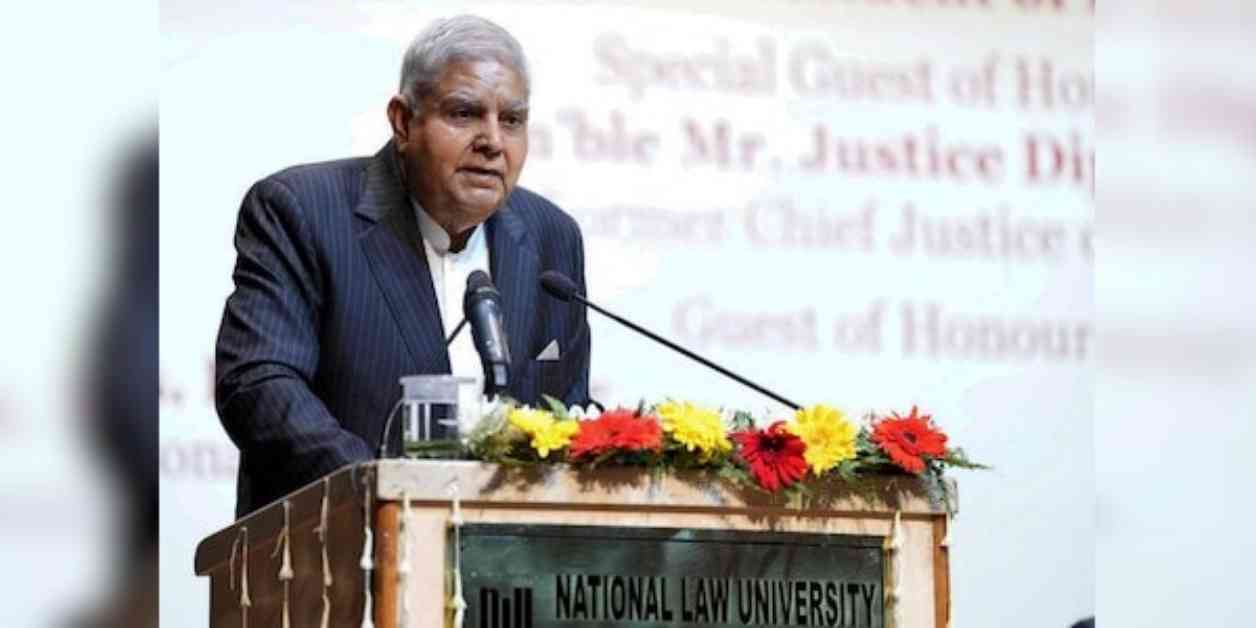Putting Political Ambitions Ahead of National Interests: Insights from Vice President Dhankar
Vice President Jagdeep Dhankar recently made a striking statement that raised eyebrows and sparked discussions across the political spectrum. His remarks, delivered at a Swarna Bharat Trust meeting in Venkatachalam, Nellore district, highlighted the unsettling trend of individuals prioritizing their political interests over the greater good of the nation. While Dhankar did not explicitly name anyone, his words were widely interpreted as a critique directed towards the Leader of Opposition in Lok Sabha, Rahul Gandhi.
In his address, Dhankar emphasized the importance of upholding national interests above all else, urging individuals to reflect on the sacrifices made by those who fought for the country’s freedom. He expressed his hope that those who have strayed from this principle would reconsider their priorities and act in the best interests of the nation.
This sentiment was further underscored by Dhankar’s concerns about a constitutional figure’s call for the Supreme Court to intervene in matters that could potentially harm the country’s economy. The Vice President’s remarks serve as a stark reminder of the delicate balance between political ambitions and national interests that all public figures must navigate.
The Freedom Struggle’s Legacy: A Call to Action
The Vice President’s call for introspection and reflection on the sacrifices made during the freedom struggle resonates deeply with India’s rich history. The struggle for independence was marked by countless acts of bravery and selflessness, as individuals from all walks of life came together to challenge colonial rule and secure the nation’s sovereignty.
The legacy of the freedom struggle serves as a guiding light for modern-day leaders, reminding them of the importance of putting national interests above personal or political gains. The sacrifices made by our forebearers should serve as a constant reminder of the values that underpin our nation and the responsibilities that come with upholding them.
As Vice President Dhankar aptly pointed out, the freedom achieved through supreme sacrifices must be nurtured and protected at all costs. It is incumbent upon all individuals, especially those in positions of power and influence, to honor the sacrifices of the past by prioritizing the greater good of the nation in their actions and decisions.
Navigating the Intersection of Politics and National Interest
The delicate balance between political ambitions and national interests is a perennial challenge that confronts leaders in every democracy. In India, a diverse and vibrant nation with a complex political landscape, this challenge is particularly pronounced.
The Vice President’s remarks shed light on the inherent tension that arises when political considerations take precedence over the broader national interest. While it is natural for individuals to have differing viewpoints and priorities, it is crucial that these differences are reconciled in a manner that upholds the fundamental values and principles that bind our nation together.
At the heart of Vice President Dhankar’s message is a plea for wisdom and discernment among those who wield power and influence. It is a reminder that the decisions made by leaders today have far-reaching consequences that can impact the lives of millions of people and shape the trajectory of the nation as a whole.
The Role of Leadership in Upholding National Interests
Leadership carries with it a profound responsibility to act in the best interests of the nation, even when faced with competing pressures and interests. This responsibility is especially critical in times of crisis or uncertainty when the stakes are high, and the need for decisive and principled leadership is paramount.
Vice President Dhankar’s remarks serve as a timely reminder of the importance of leadership that is guided by a commitment to the common good. In a political landscape where self-interest and partisanship often overshadow the broader national interest, leaders must demonstrate courage and integrity in standing up for what is right, even when it is not the most politically expedient choice.
The Vice President’s call for wisdom and reflection is a clarion call to leaders across the political spectrum to rise above petty politics and prioritize the well-being of the nation. It is a reminder that the true measure of leadership lies not in the pursuit of personal gain or power but in the ability to make tough decisions that benefit the greater good.
Conclusion
Vice President Jagdeep Dhankar’s remarks on the need to prioritize national interests over political ambitions have sparked important conversations about the role of leadership in upholding the values that underpin our nation. His call for wisdom and reflection serves as a powerful reminder of the sacrifices made by those who fought for our freedom and the responsibilities that come with preserving and protecting that legacy.
As we navigate the complex intersection of politics and national interest, it is vital that leaders across the political spectrum heed Vice President Dhankar’s message and act with integrity, courage, and a deep sense of duty to the nation. Only by placing the common good above personal or political considerations can we build a stronger, more united India that honors the sacrifices of the past and paves the way for a brighter future.




















